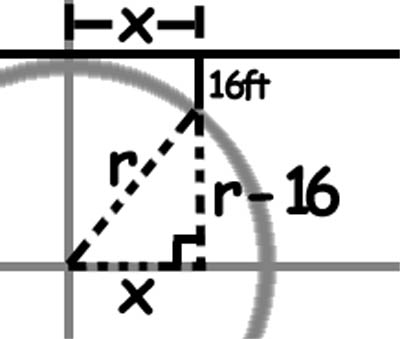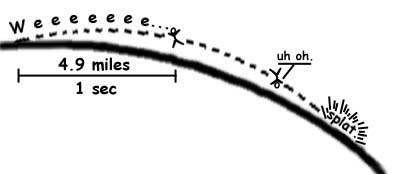HOW TO FLY
By Ryan Somma“The knack of flying is learning how to throw yourself at the ground and miss”
With these words, Douglas Adams helpfully explained concept of flying in his Hitchhiker’s Guide to the Galaxy. But the ground is really big, and, as the Tick so sagely noted, “Gravity is a harsh mistress.” So herein contained is my handy-dandy explanation of how you can impress your friends and family by throwing yourself at the ground and missing:
Step one, throw yourself at the ground. Luckily, this is really easy thanks to gravity, which will pull you down to the ground at an acceleration rate of 32.174 feet per second per second, meaning every second you are falling to the ground, you fall 32 feet (9.8 meters) per second faster. If you want to fall for one second, just spend enough energy to climb 16 feet (4.9 meters) above ground and drop. Voila!
Step two, miss. This is the not so easy part. If you’re reading this, then I assume you are a nerd (like me) and probably still wake up some nights in a cold sweat with nightmares about dehumanizing games such as “Dodge Ball” and possibly even it’s more sadistic cousin “Smear the Queer” from your youth. Now we’re trying to dodge a planet 7926.28 miles (12756.1 kilometers) across at the Equator. Might as well just throw in the towel and brace ourselves for the wedgies, noogies, and nipple cripples. Right?
WRONG!
We don’t have to miss the whole Earth at once, just enough to keep from hitting it each moment. The Moon does this all the time, dodging the Earth faster than it falls toward it - and it’s just a big dumb rock. We don’t want to be dumber than a rock, do we?
Okay then. All we have to do is dodge faster than we fall.
If we fall 16 feet (4.9 meters) in the first second, then we simply have to dodge far enough for the Earth to curve away 16.087 feet below us in one second. Knowing how far to dodge is, as G.I. Joe so wisely said, “half the battle.”
Which brings me to step three, find someone who knows math. In my case, I contacted my brother, Para, who teaches Multivariable Calculus at Georgetown Day School in Washington DC.
Para drew an angle on my circle representing the Earth, “It’s real simple,” he said. “See, sine is the opposite divided by the hypotenuse, cosine is the adjacent divided by the hypotenuse, and tangent is opposite divided by the adjacent. SOHCAHTOA, or Some Old Horse Caught Another Horse Taking Oats Away.” He drew a bunch of equations out for me. “See?”
“Huh,” I muttered.
“I’ve lost you, haven’t I?”
“Um,” I thought about lying, but he’s my brother, he can tell, “yeah.”
“Didn’t you take Trigonometry in high school?”
“Triggawhatromee?”
“Okay,” Para put the pen to his mouth thoughtfully. “I think I see a way to do this with just algebra.”
“Algebra… That sounds familiar. That’s math, right?”
“Hush,” Para drew the following diagram:
Where x is the distance we have to travel for the Earth to curve 16 feet away from under our feet and r is the radius of the Earth. Because we have right triangle and know the radius of the Earth is 20,925,379.2 feet (6.378,055.6 meters), we can use the Pythagorean theorem to find x, like so:
r2 = x2 + (r - 16)2 Which, Para showed me, can be converted to:
x2 = r2 - (r2 - 32r + 256) And then, according to Para, the r’s cancel out, leaving us with:
x2 = 32r + 256 Which means x equals the square root of 32r + 256! (Once again, according to Para, so if this is wrong, blame him.)
Plug 20,925,379.2 feet (6.378,055.6 meters) into r and we find that we have to travel 25,876.9 feet (7,887.2 meters) or 4.9 miles (7.0 kilometers) in one second to successfully keep from hitting the Earth. Case closed right?
WRONG! SIT BACK DOWN!
Does stick-man make it? Or is he doomed to a fiery death? To read the exciting conclusion, go here!
Tune in next week for another episode of "Isaac steals cool stuff from better writers"!




















